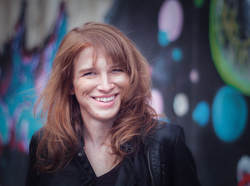A Body Knows the Truth
A Debut Novel Explores Survival While Brown and Queer
|
At a moment when Lucky, the central character of SJ Sindu’s Marriage of a Thousand Lies, cracks, rupturing under the weight of all the lies she’s told her family and herself, she says this:
Most people think the closet is a small room. They think you can touch the walls, touch the door, turn the handle, and walk free. But when you’re inside it, the closet is vast. No walls, no door, just empty darkness stretching the length of the world. Lucky speaks from deep within her particular closet: 27, married to a gay man, lying to her Sri Lankan family, and cruising for one-night stands with women. “A fuck’s a fuck,” she and her husband, Kris, tell each other as they rotate partners in and out of their house. When she is called home to a Boston suburb to care for an ailing grandmother, we see how vast her closet is and why. In her remarkable debut novel, Sindu creates a haunting story of living with other-ness multiplied. Lucky is queer and brown. She’s an other in the world of white American society, but also an unacceptable other in her immigrant community and family. “Let me tell you about being brown like me,” she says. “Your story is already written for you.” Lucky has become an other to herself, a body that The consequences of telling a different story aren’t just speculation for Lucky, but proven truth: When her family learned she was lesbian while in college, they cut her off. Lucky and Kris, both homeless and desperate, came up with their arrangement as a method of pure survival. But as a result, Lucky has also become an other to herself, a body that wants to be queer, and a mind that tells lies to keep alive.
* * * Reading Sindu’s book, I thought often about the rigidity of rules and roles. Sindu balances the compounding other-ness of Lucky with a sure hand, a compelling and contemplative narrative, and rich characters. But throughout there’s also powerful exploration of what it means to be seen as a woman. When Lucky returns home, her mother pinches her biceps and fingers her hair. Women’s arms should be soft, she says. Their hair should be long. Femme = pretty. A good girl. And this is just the start of the rules. |
Lucky, by being queer, has seen under and through the rules for women, and for immigrants, and for the entire scaffolding of society. We see, as Lucky moves within the Sri Lankan community, that women should not drive. They should be pious, and quiet. They should stay fairly quarantined during their periods. They should talk about their children, or their plans to have children, or the food that they serve to the men at family functions.
The rules are defined in part by the family’s clinging to Sri Lankan culture. But these are rules I recognize as well. In my family, born and socialized in the middle of the U.S., women are in the kitchen on holidays, and men on the couch. Women talk about their children and schools, and men talk about football. Girls must be soft and sweet, boys must never cry or be caught idle.
As I read Lucky’s story, I thought about how a culture replicates itself. We learn what makes a woman, or a man, and we learn what makes “normal.” We learn it, and then we teach it to others, and model it for others. We push single friends to get married like us, or have children like us, like a cult recruiting new members. Lucky, by being queer, has seen under and through the rules for women, and for immigrants, and for the entire scaffolding of society. She knows the rules make women, and men, things. Bodies to be subdued, trapped in closets that never end. She can see the consequences that create the closet. But Sindu, through her book, also shows that queerness might let us see the contours of the closet, and a way to blow it wide open. * * * Sindu creates beauty with hard edges, lyrical language paired with wrenching plot. She creates a character who feels forced to be an actress, and shows what a thousand lies does to a body (numbness to emotion) and to a mind (no long-term thinking allowed). Eventually, though, the body and mind cry out for truth. Lucky reconnects with her teenage love, Nisha, also playing a role, also preparing to marry a man. Practiced liars, there’s something new this time, breaking through the numbness. Sindu shows this with her use of Lucky’s direct address to us. “Here’s the truth,” she tells us, analyzing what she’s doing to herself. And it pushes us toward one of those perfectly inevitable, yet surprising, endings, giving readers a satisfying finale that sticks with us. |

REVIEWED BY AMY LEE LILLARD
Amy Lee Lillard was named one of Epiphany’s Breakout 8 Writers in 2018. Her fiction and non-fiction also appear in Atlas and Alice, Off Assignment, Grist, and Entropy. She holds an MA in literature from Northwestern University, and an MFA in fiction writing from the Pan-European Program at Cedar Crest College. Find her online: Twitter at @amyleelillard and Web at amyleelillard.com.
Amy Lee Lillard was named one of Epiphany’s Breakout 8 Writers in 2018. Her fiction and non-fiction also appear in Atlas and Alice, Off Assignment, Grist, and Entropy. She holds an MA in literature from Northwestern University, and an MFA in fiction writing from the Pan-European Program at Cedar Crest College. Find her online: Twitter at @amyleelillard and Web at amyleelillard.com.
